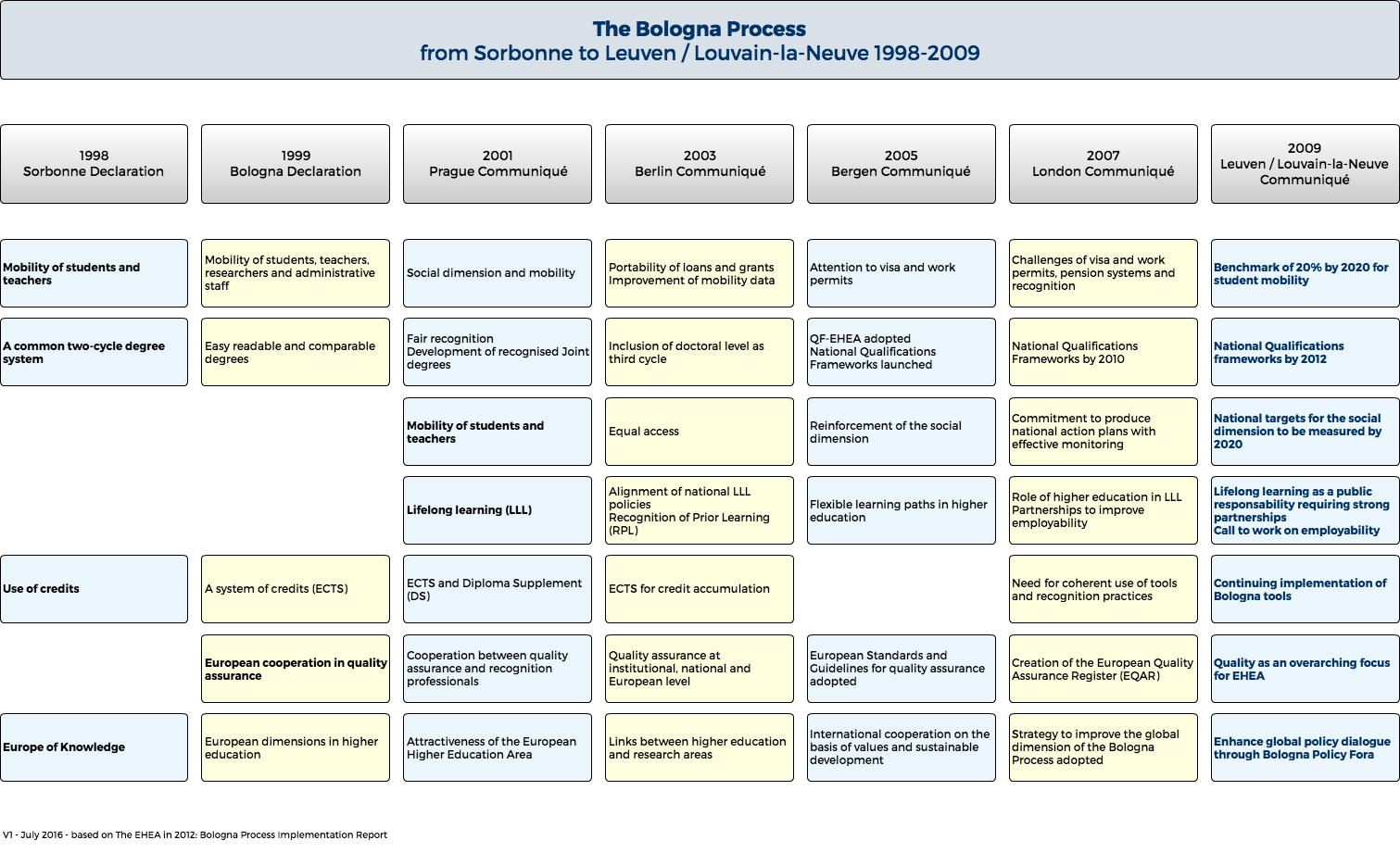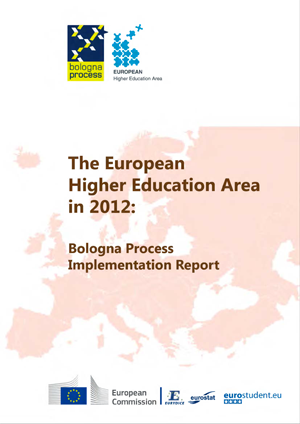Data collection 2009-2012
Working Group on Reporting on the Implementation of the Bologna Process 2009-2012
The Working Group defined indicators and prepared an integrated report on the progress of the implementation of the Bologna Process.
The Bologna context
The Bologna Declaration was signed in 1999 by ministers responsible for higher education from 29 European countries. This set in motion the most significant European cooperation process ever to take place in the field of higher education. Reforms have now affected countries within and beyond Europe, and the number of official signatory countries has risen to 47 with Kazakhstan the most recent state to join.
Source: 2010 Budapest-Vienna Declaration
The Bologna Process: from Sorbonne to Leuven/Louvain-la-Neuve, 1998-2009
The chart outlines the main milestones of the ministerial conferences within the Bologna Process up to 2009. It illustrates that several main themes can be followed throughout the first decade. These include a common degree system, a European system of credits, mobility, cooperation in quality assurance, national qualifications frameworks, lifelong learning, employability and the social dimension of higher education.
The Leuven/Louvain-la-Neuve Communiqué sets the agenda for the new decade, with a new target for mobility in 2020, and clear goals for the other main action lines. These goals and objectives are all addressed in the report, and the combined analysis across the seven chapters aims to present a picture of the current reality of the European Higher Education Area that was launched with the Budapest-Vienna Declaration of March 2010 (see Glossary and Methodological Notes for the list of official signatory countries).
Source: 2009 Leuven Louvain-la-Neuve Communiqué - English
Report outline
The European Higher Education Area in 2012: Bologna Process Implementation Report
This integrated report has been prepared for the European Ministerial Conference in Bucharest, Romania, on 26-27 April 2012.
The report provides a snapshot of the state of implementation of the Bologna Process from various perspectives using data collected in the first half of 2011. It provides both qualitative information and statistical data and covers all main aspects of higher education reforms aiming at a well-functioning European Higher Education Area.
The report is a successor to the Bologna Process Stocktaking Reports and has been developed as a fully collaborative exercise between the Bologna Follow-up Group (BFUG) and Eurostat, Eurostudent and Eurydice, commonly referred to within the process as "the data collectors".
- Bologna Process Stocktaking Report 2009
- Bologna Process Stocktaking London 2007
- Bologna Process Stocktaking 2005
Qualitative information was gathered through a questionnaire addressed to BFUG members which was submitted, after consultation with all relevant national actors, by the Bologna representatives in 45 countries between January and May 2011. Information for "the former Yugoslav Republic of Macedonia" and Russia is partial due to non completion of the questionnaire. For the United Kingdom and Belgium, two responses each were submitted. England, Wales and Northern Ireland is therefore treated as separate higher education system to that of Scotland, and the Flemish and French Communities of Belgium are also considered as distinct higher education systems. The questionnaire covered all topics addressed in this report with the exception of mobility. Information on mobility was gathered by the BFUG mobility working group, in cooperation with the data collectors in autumn 2010. The reason for this earlier collection is that the information was required to enable the mobility working group to elaborate a Mobility strategy 2020 for the European Higher Education Area (EHEA) - Mobility for Better Learning.
The report is based mainly on official information about legislation, regulations and national policies, which is complemented by statistical data collected by Eurostat and survey data from the European student population provided by Eurostudent. Eurostat data is extracted from the UOE, LFS and EU- SILC data collections. Moreover, Eurostat undertook a specific data collection for the EHEA countries that are not part of regular data gathering exercises. Eurostudent data is taken from the Eurostudent IV dataset which is analysed in detail in Eurostudent, 2011: Social and Economic Conditions of Student Life in Europe.
The work of the data collectors has been overseen by the Bologna Follow - up Group, and specifically by a working group established to guide all aspects of this reporting process. The group has been co-chaired by Germain Dondelinger (Luxembourg) and Andrejs Rauhvargers (Latvia). Close collaboration has also been established with the BFUG working groups on mobility, social dimension, international openness, qualifications frameworks and recognition. Contact was not developed with the working group responsible for monitoring transparency tools as it was agreed that this topic was beyond the scope of the report.
The report is divided into seven thematic chapters that each has an introduction presenting the relevance of the topic in the Bologna Process and the objectives agreed upon, the contribution of BFUG working groups to the report, and an outline of the chapter contents.
- Context of the European Higher Education Area
- Degrees and Qualifications
- Quality assurance
- Social Dimension in Higher Education
- Effective Outcomes and Employability
- Lifelong Learning
- Mobility
Report
The report, which reflects the framework of the Leuven/Louvain-la-Neuve Communiqué, is the result of a joint effort by Eurostat, Eurydice as well as by Eurostudent and has been overseen by the Bologna Follow-up Group and more specifically by a working group established by the latter.
In line with the specific mission and methodology of the aforementioned data collectors, the report describes the state of implementation of the Bologna Process in 2012 from various perspectives and with data ranging from 2010 to 2011 as well as with earlier trends data for some statistical figures. Thus the report provides statistical data as well as contextualized information and it compares social and economic data on student life. Statistical evidence is complemented by normative system descriptors as well as by an analysis of how the system works. The former scorecard indicators have been newly revised by the Bologna Follow-up Group and integrated into the report as Bologna indicators.
The European Higher Education Area in 2012: Bologna Process Implementation Report


